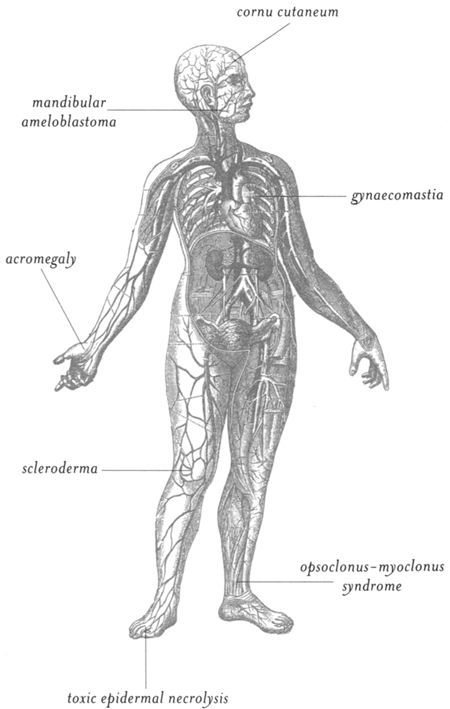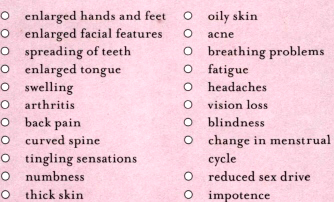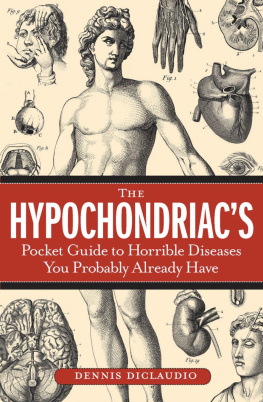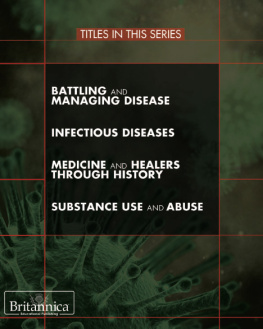THE
HYPOCHONDRIAC'S
Pocket Guide to Horrible Diseases
You Probably Already Have
This is a work of humor. The diseases and the information on them are real, butsome facts may have been omitted because they were boring or to make room forgratuitous profanity. This is not to be used as a medical text.
Copyright 2006 by Dennis DiClaudio
All rights reserved. No part of this book may be used or reproduced in any manner whatsoever without written permission from the publisher except in the case of brief quotations embodied in critical articles or reviews. For information, address Bloomsbury Publishing, 175 Fifth Avenue, New York, NY 10010.
Published by Bloomsbury Publishing, New York and London
Distributed to the trade by Holtzbrinck Publishers
All papers used by Bloomsbury Publishing are natural, recyclable products made from wood grown in well-managed forests. The manufacturing processes conform to the environmental regulations of the country of origin.
Library of Congress Cat a loging-in-Publication Data
DiClaudio, Dennis.
The hypochondriac's pocket guide to horrible diseases you probably already have / Dennis DiClaudio.1st U.S. ed.
p. cm.
eISBN: 978-1-59691-769-9
I. HypochondriaHumor. 2. HypochondriaPopular works. I. Title.
RC552.H8D53 2005
616.85'25dc22
2005053014
First U.S. Edition 2006
10 9 8 7 6 5 4 3 2 1
Printed in Singapore by Tien Wah Press
THE
HYPOCHONDRIAC'S
Pocket Guide to Horrible Diseases
You Probably Already Have
DENNIS DICLAUDIO
BLOOMSBURY
CONTENTS
As we go about our daily livesordering a fourth round of mojitos, waiting in line at the supermarket to pay for our hummus, delicately hanging our photographs of tropical fishthere are a staggering number of things trying to get inside our bodies. Viruses, bacteria, worms, insects, bloodsucking fish. These things are hungry to enter our warmth and feed from our flesh, to multiply, to overtake our biological functions. And our immune systems cannot keep them all at bay. Some will get through, storm the gates, and ravage our fragile constitutions. And even as we are under siege from these intruders, we are being attacked from the inside as well. Organs faltering, neurotransmitters in the brain misfiring, long-dormant and mischievous genes sparking to life. It seems miraculous that any of us have lasted this long.
There are thousands upon thousands of diseases known to man. Medical texts on dusty library shelves are packed full with them. In writing The Hypochondriac's Pocket Guide to HorribleDiseases You Probably Already Have, I wasn't concerned with the huge majority of those diseases. After a great deal of research, I decided to settle upon a simple forty-five. The forty-five diseases included here are some of the worst, the deadliest, the strangest, the most repulsive, the most unpleasant maladiesall of them IOO percent genuinethat currently exist out there, waiting for you.
This book, however, was not intended to serve as a definitive resource for the included diseases. If, after careful self-diagnosis based upon your apparent symptoms, you come to the conclusion that you have Marburg hemorrhagic fever or cerebral sparganosis, get a second opinion. Seek the advice of neighbors and coworkers, the guy who sells imported salami to the guy who runs the corner delicatessen. Submit yourself to the capable minds of an Internet message board. As a last resort, you may want to consider talking to a qualified physician. But don't begin medicating or amputating yourself based upon the information contained herein. I, the author, am not a doctor. I am one of youcowering, anxious, obsessively washing his hands. There are better authorities on these matters. Find them.
If you should find that you do indeed have one of the diseases included in these pages, please understand that it is not my intention to make light of your terrible situation.
You've got it hard enough as it is.
Please enjoy these horrible diseases, and may God have mercy on your soul.
-DennisJ. DiClaudio, Jr., B.A.

In which an overachieving immune system
causes excess growth in parts of your body
that were better left alone.
In which excess growth hormones make it necessary for you to keep buyingnew hats, gloves, and shoes.
SYMPTOMS

DIAGNOSIS
It's funny how your body changes in very subtle ways, day by day, so that you never really notice it. You look at your reflection in the mirror and it seems a reasonable enough facsimile to the person you saw staring back at you yesterday, but in reality it's slightly different. Time takes its toll, not in great leaps, but in small, measured steps. You have a few less hairs. The wrinkles are deepening beneath your eyes. Your wedding band digs tighter into your finger. Your skull grows wider, your forehead more sloped. Gaps form between your teeth. And your jaw isn't supposed to protrude from your face quite so prominently, is it? One day, you meet an old friend on the street, and she says, "Holy shit! Why is your head so big?" It's all a part of getting old. Well, getting old and having an acute case of acromegaly (ak"-ro-meg'-ah-le).

The word itself is derived from Greek: akro, meaning "ends" or "extremities," and megas, meaning "large" or "super humongous." The effects of the disease, caused by an excess of growth hormones (brought on most often by a tumor growing on your pituitary gland), usually become apparent during adulthood, manifested as abnormally large hands and feet, but it can also give you a big nose, thick lips, a sloping forehead, and general facial disfigurement so that you end up looking kind of like folk-rock musician Neil Young.
And, yes, it can affect your penis as well.
PROGNOSIS
It will be much easier to bar chords on your guitar. With that and the penis enlargement, you might think that acromegaly isn't so horrible as horrible diseases go. There are some downsides. The growth hormones will also affect the organs, which can lead to heart disease, high blood pressure, heart rhythm disorders, diabetes, and colon cancer. Your chances of premature death will be increased IOO percent.
The disease is usually caused by a tumor of the pituitary gland, which is inside your skull, so all sorts of other problems may arise as it grows, squeezing itself against your brain and eyes. These may include headaches, vision loss, reduced sex drive, and impotence. So much for the penis thing.
PREVENTION
If you know a method for preventing tumors from growing inside your skull, then, by all means, use it.
TREATMENT
You can have the pituitary gland removed surgically. This will mean entering the skull through an incision in the nose and digging the tumor out. (Note: Please, do not attempt this on your own. Doctors are much more experienced with these things and have much better tools.)
Another option is drug therapy. Pegvisomant, octreotide, and bromocriptine can help to normalize the production of growth hormones in the body. But this can take years to have any effect, and even if it does, the disfigurement caused by overgrown bones is irreversible.
Next page









